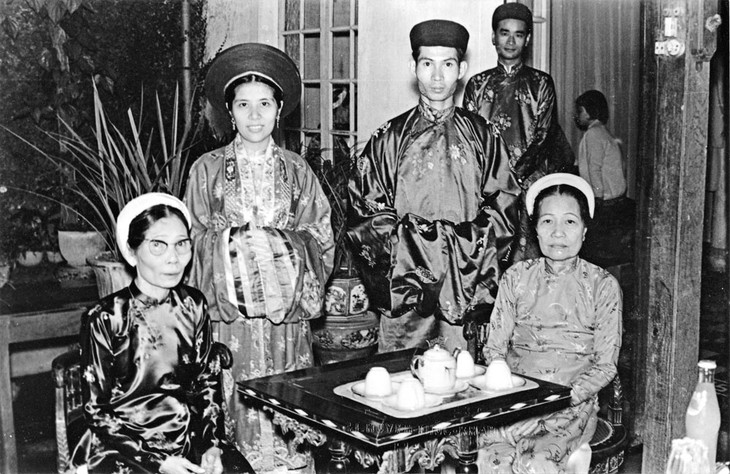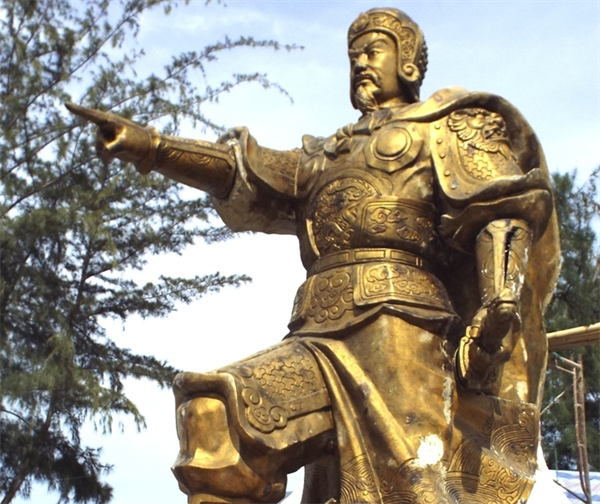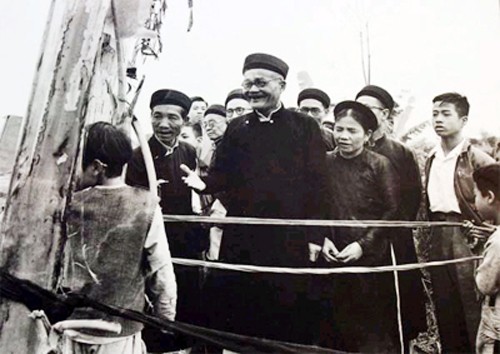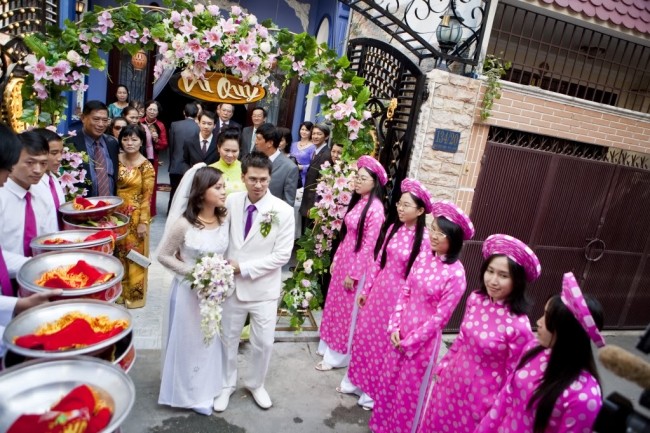(VOVworld) - Over years, the Vietnamese concepts of love and marriage have evolved. Nowadays, single mothers, cohabitation, same-sex marriage, and sex before marriage are becoming more accepted. Males and females are now free to find their own partners and marriages are built on love and respect. Attitudes toward these things were very different in the past.
“First I remember us having faith in each other
Second I remember the grace of our love
Third I remember your voice
Forth I remember my dear confidante
Fifth I remember your charming smile
Sixth I remember sending you my warm regards
Seventh I remember you, my soul mate
Eighth I remember your letter
Ninth I remember you as my staunch companion
Tenth I remember your truthful love”
In Vietnam, there was a time when people fell in love just by singing together and exchanging poems at the village’s communal house. The sweet and emotional voices of male and female singers performing this “Ten things remembered” song conveyed their interests in each other. It’s no accident that Vietnam’s rich folk culture contains so many songs and proverbs praising love and marriage. The idea of falling in love and getting married has been embedded in every Vietnamese person since the folk love tale of Lac Long Quan and Au Co, who are believed to have given birth to Vietnamese people.
 |
In the past, many couple got married because of family's arrangement, not because of love. (Photo: Vietnam Women's Museum)
|
Dr. Tran Trong Duong of the Institute of Han-Nom Studies has authored several works and projects examining the Vietnamese concepts of love and marriage throughout the history. He says: “In Vietnamese history, there have been several famous stories of true love, including the story of national hero Tran Quoc Tuan, who fell in love at first sight. To many of us, he is best known as the Supreme Commander of Vietnam during the Tran Dynasty in the 13th century who won multiple victories over the mighty Mongol invaders. But, his strong and faithful love for Princess Thien Thanh, was highly praised and was recorded in the Complete Annals of Dai Viet. It said that Emperor Trang Thai Tong formally engaged Princess Thien Thanh to another ruler but Tran Quoc Tuan openly declared his love for the Princess and plotted to steal the bride. Eventually, the Emperor had to accept their love and allow them to get married.”
 |
To many Vietnamese people, Tran Hung Dao is best known as the Supreme Commander of Vietnam during the Tran Dynasty in the 13th century. But his strong and faithful love for Princess Thien Than was also highly praised and was recorded in the Complete Annals of Dai Viet. (Photo: Bien Phong)
|
Nguyen Kim Nhu, the co-founder of a project called Under the Green Moss to promote Vietnamese history to young people via interactive videos, said love and marriage played an important role in shaping Vietnam’s history. She says: “To many people, history seems to be boring. But, love and marriage is something everyone is interested in no matter which era they come from. In the past, Confucian scholars said one must improve oneself and uphold the family’s order in order to manage a country and ensure peace to the people. I think marriage was the foundation of many other relationships. Many used their children’s marriage for political purposes. At one time, Vietnamese people strictly followed customs and rules – even if outdated. But even so there were still many stories about bold lovers who overcame obstacles, such as the love between Emperor Le Thanh Tong and Empress Truong La, or between Emperor Ly Thanh Tong and his concubine Y Lan”
 |
According to Ngo Duyen of Dai Viet Co Phong Project, in the past, to get married, the couple and their families had to complete all 6 ceremonies, excluding this "Nap Cheo" additional ceremony. (Photo: Gia Dinh Viet Nam)
|
Throughout history, Vietnamese people honored the concepts of marriage, no matter what purpose the marriage served. The couple’s families had to ask the village’s elders for their permission for the young people to wed. Ngo Duyen is from Đại Việt Cổ Phong - the Ancient Vietnam group - a project begun by young people in 2014 to trace Vietnam’s historical and cultural objects and customs. Duyen says: “To get married, the couple and their families had to complete all 6 ceremonies, including marriage proposal, betrothal ceremony, wedding ceremony, and the bride’s arrival at the groom’s house. There was also an additional ceremony that the two families performed called “Nap cheo”, in which they gave some money to the village to build temples, a communal house, or roads. The people of the village would decide how much the two families had to pay according to their financial status and whether the bride or the groom was from a different village.”
 |
Dr Duong said few important rituals are performed at traditional weddings, which makes modern marriage ceremonies less fun. (Photo: Internet)
|
Nowadays, a few important rituals are performed at traditional weddings but many are very much simplified or virtually ignored. Dr. Tran Trong Duong regrets that Vietnamese people don’t fully preserve and protect their wedding traditions: “In modern life, Vietnam has lost many of its signature marriage practices. For example, in the past, when the bride arrived at the groom’s house, one person would use a pestle to hit a mortar because Vietnamese people considered pestle and mortar a symbol of prosperity and sexual intercourse. The mother-in-law had to hide prior to the bride’s arrival to prevent later disagreements. Today many rituals are ignored as not suitable for modern life. I think it makes marriage ceremonies less fun.”
Marriage should be one of the happiest events in the life of each person. It is a volunteer arrangement between two individuals. But, in a society under the influence of Confucianism, the role of women was diminished and vestiges of this gender equality persist today. Dr. Duong again: “I believe every human wants to get married to the one they love. But, at the time when Vietnamese society studied Confucianism and followed a feudal political system, people did not consider marriage a symbol of love but a uniting of two individuals for the sake of the two families. The couple was required to fulfill their duty to the family by giving birth to a boy, who would maintain the continuity of the family line and those who couldn't were considered disrespectful to their parents. This outdated idea of needing a son is still deeply embedded in Vietnamese values and widely manifests today.”
 |
Both Dr. Duong and Nhu agreed that the outdated idea which values men more than women is still manifested today and needed to be changed. (Photo: baria-vungtau.org.vn)
|
Nguyen Kim Nhu agrees with Dr. Tran Trong Duong. She believes the younger generation must adopt a pioneering role to change what is not suitable in the modern era. Nhu said the growing acceptance of single mothers, cohabitation, and same-sex marriage reflects increasing openness, justice and respect for individuals, including women: “In the past, a wife had to stay loyal and faithful to her husband but a husband could have as many wives as he wanted. The wife was disadvantaged and remained passive. Many families were so poor they had to literally ‘sell’ their daughters for money. Nowadays, as we adopt many modern Western values, we can look back at our past and decide what should be kept and what should be changed. Culture is something that flows. What is new today will turn old tomorrow. It must change to be become better.”